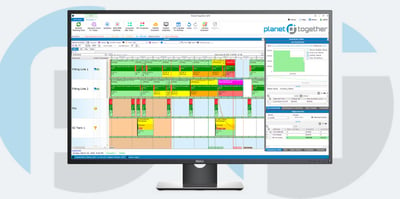Cloud-Based SCM Collaboration Platforms
Supply Chain Managers face numerous challenges, from ensuring product quality and compliance to optimizing production schedules and managing inventory efficiently. To meet these demands, companies are increasingly turning to cloud-based Supply Chain Management (SCM) collaboration platforms. These platforms not only streamline operations but also offer a competitive edge.
In this blog, we'll look into the benefits of cloud-based SCM collaboration platforms and explore the integration possibilities with PlanetTogether and leading ERP, SCM, and MES systems such as SAP, Oracle, Microsoft, Kinaxis, and Aveva.

Adopting Cloud-Based SCM Collaboration Platforms
Medical manufacturing is characterized by its strict regulatory requirements, stringent quality control, and the need for real-time decision-making. To address these challenges, Supply Chain Managers are adopting cloud-based SCM collaboration platforms. Here are some key reasons why these platforms are gaining traction in the industry:
Real-time Visibility: Cloud-based SCM collaboration platforms offer real-time visibility into the entire supply chain. This visibility allows Supply Chain Managers to track inventory levels, monitor production progress, and respond quickly to disruptions or changes in demand.
Collaboration: These platforms facilitate seamless collaboration between different departments and external partners, such as suppliers and distributors. Effective communication and data sharing lead to better coordination and reduced lead times.
Scalability: Cloud-based solutions are highly scalable, allowing companies to adapt to changing market conditions and rapidly expand or contract their operations as needed.
Data Analytics: Advanced analytics and reporting capabilities provide valuable insights for decision-making. Predictive analytics can help forecast demand, optimize inventory levels, and improve overall supply chain performance.
Compliance and Quality Control: Medical manufacturing requires strict adherence to regulations and quality standards. Cloud-based SCM collaboration platforms enable better traceability and documentation, ensuring compliance throughout the production process.


PlanetTogether: A Powerful Production Scheduling Solution
PlanetTogether is a leading production scheduling software that assists manufacturers in optimizing production processes. Its powerful capabilities include capacity planning, demand forecasting, and scheduling optimization. By integrating PlanetTogether with cloud-based SCM collaboration platforms, Supply Chain Managers can enhance their decision-making processes and achieve greater operational efficiency.

Integration Possibilities with Leading ERP, SCM, and MES Systems
Now, let's explore how cloud-based SCM collaboration platforms can integrate with popular ERP, SCM, and MES systems like SAP, Oracle, Microsoft, Kinaxis, and Aveva to create a holistic solution that empowers Supply Chain Managers in medical manufacturing facilities.
Integration with SAP
SAP is a widely used ERP system that provides end-to-end solutions for various industries. By integrating PlanetTogether with SAP, medical manufacturing companies can achieve seamless data flow between production scheduling and enterprise resource planning. Key benefits include:
- Real-time synchronization of production schedules with procurement and inventory management in SAP.
- Improved demand forecasting accuracy by leveraging historical data and analytics from both systems.
- Enhanced production visibility, allowing for quick response to changes in demand or supply.
Integration with Oracle
Oracle offers a comprehensive suite of cloud-based SCM and ERP solutions. Integrating PlanetTogether with Oracle provides Supply Chain Managers with a robust toolset for managing their operations efficiently. Key advantages include:
- Real-time data exchange between production scheduling in PlanetTogether and Oracle's SCM and ERP modules.
- Streamlined order processing and fulfillment, resulting in shorter lead times.
- Better inventory control through synchronized stock levels and demand forecasts.
Integration with Microsoft Dynamics
Microsoft Dynamics is a versatile ERP system that is highly adaptable to specific industry needs. When integrated with PlanetTogether, medical manufacturing companies can benefit from:
- Seamless data integration between production scheduling and Microsoft Dynamics ERP.
- Improved order accuracy and on-time deliveries through synchronized data.
- Advanced reporting and analytics for better decision-making.
Integration with Kinaxis
Kinaxis is a specialized SCM solution that focuses on supply chain planning and optimization. Integrating PlanetTogether with Kinaxis allows for:
- Comprehensive supply chain visibility, enabling Supply Chain Managers to make data-driven decisions.
- Enhanced demand forecasting and inventory optimization through combined capabilities.
- More accurate production scheduling based on real-time data from Kinaxis and PlanetTogether.
Integration with Aveva
Aveva offers MES solutions designed to improve manufacturing operations. Integrating PlanetTogether with Aveva MES can lead to:
- Real-time production data synchronization, allowing for immediate adjustments to production schedules.
- Improved quality control and compliance with regulatory standards.
- Enhanced traceability and visibility across the manufacturing process.
Choosing the Right Integration Strategy
Selecting the right integration strategy depends on your specific needs and existing systems. Here are some considerations when integrating cloud-based SCM collaboration platforms with PlanetTogether and ERP, SCM, or MES systems:
Define Objectives: Clearly define your integration goals, whether it's improving production scheduling, demand forecasting, or inventory management.
Assess Compatibility: Evaluate the compatibility between your chosen cloud-based SCM collaboration platform and the ERP, SCM, or MES system. Ensure that data can be seamlessly exchanged between the two.
Budget and Resources: Assess the budget and resources required for integration. Consider factors like implementation costs, ongoing maintenance, and the availability of IT personnel.
Data Security: Ensure that data security protocols are in place to protect sensitive information as it moves between systems.
Scalability: Choose an integration strategy that allows for scalability as your business grows.
Training and Support: Provide adequate training and support for your team to maximize the benefits of the integrated system.
In the world of medical manufacturing, the integration of cloud-based SCM collaboration platforms with systems like PlanetTogether, SAP, Oracle, Microsoft, Kinaxis, and Aveva offers immense potential for Supply Chain Managers. These integrations provide real-time visibility, enhanced collaboration, and data-driven decision-making capabilities.
As you explore the possibilities of integrating these systems, remember to carefully define your objectives, assess compatibility, and consider factors like budget, security, and scalability. With the right integration strategy in place, your medical manufacturing facility can streamline operations, improve quality control, and stay ahead of the competition in this dynamic industry.
Are you ready to take your manufacturing operations to the next level? Contact us today to learn more about how PlanetTogether and integrated scheduling solutions can help you achieve your sustainability goals and drive success in the medical industry.


